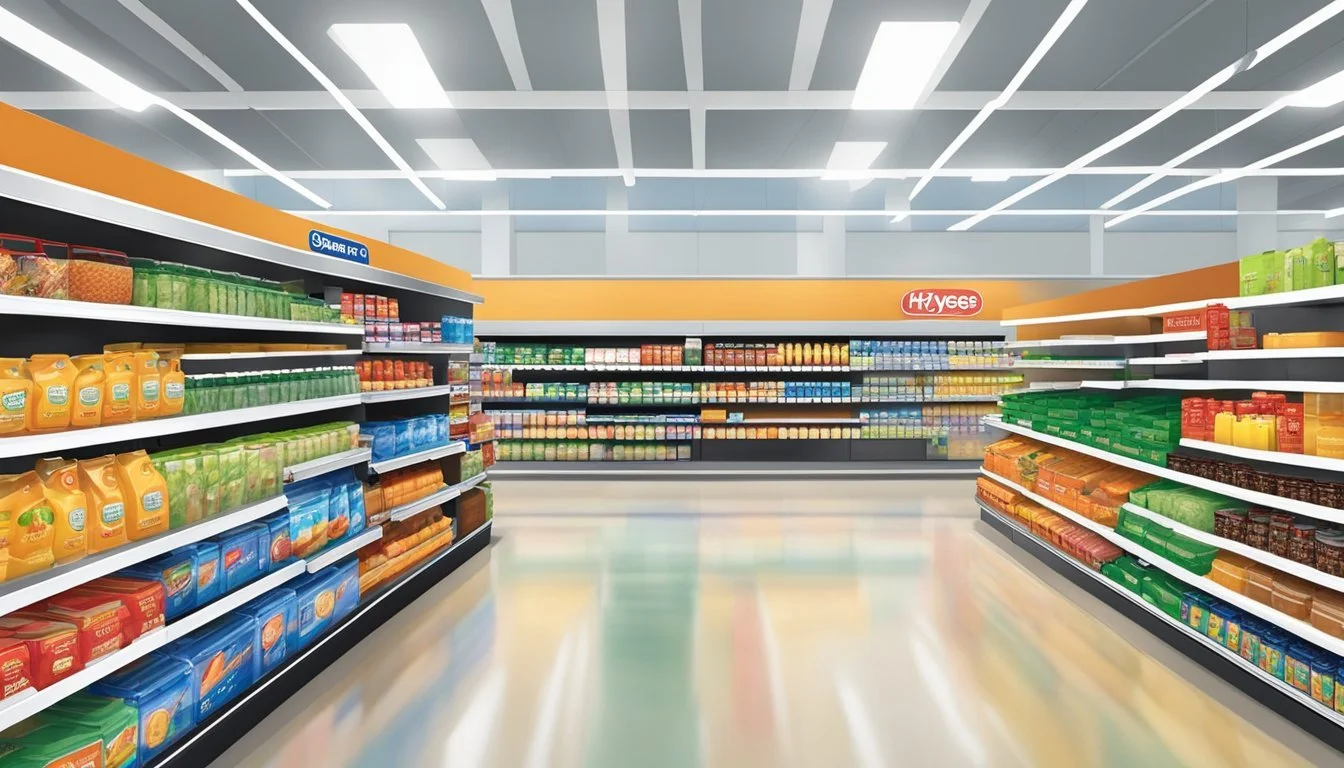Sam's Club vs Hy-Vee
Comparing Membership Perks, Prices, and Selection
Part of Our Grocery Store Guide with Details on Sam's Club and Hy-Vee
When deciding where to shop for groceries and household items, consumers often weigh the benefits of membership warehouse clubs against traditional supermarket chains. Sam's Club, a membership-only retail warehouse club owned by Walmart Inc., provides bulk products at competitive prices, positioned to cater to both individual and small business needs. On the other hand, Hy-Vee, an employee-owned chain of supermarkets located primarily in the Midwest, emphasizes its wide variety of health-conscious options, customer service, and community involvement as distinguishing features.
Shoppers choose Sam's Club for its cost-effectiveness and bulk purchasing options, which can offer considerable savings for large families or businesses. In addition, Sam's Club has been known to provide a range of services beyond the typical supermarket, including pharmacy, optical, and free shipping for its premium members. Conversely, Hy-Vee is recognized for its commitment to local produce and a hefty selection of organic and specialty foods, thereby attracting customers who prioritize food quality and shopping experience over mere pricing concerns.
Given these differences, the debate on whether Sam's Club or Hy-Vee is the better grocery store is not solely about pricing or product selection. It encompasses various factors, including shopping preferences, geographical accessibility, and the particular needs of the shopper, making the answer to this question highly individual. This article examines the key aspects of both retailers to provide consumers with a clearer understanding of what each store brings to the table.
History and Background
In the competitive landscape of grocery retail, the heritage of a store often contributes to its reputation and customer loyalty. Sam's Club and Hy-Vee each have distinct origins that have shaped their development into the brands they are today.
Sam's Club Origins
Sam's Club was founded in 1983 as a division of Walmart Inc. It was named after Walmart's founder, Sam Walton. The concept of Sam's Club was to serve as a membership-only warehouse club that would leverage Walmart's expertise in bulk purchasing and operations to offer products at a lower cost for both small businesses and individuals.
Hy-Vee Beginnings
Hy-Vee traces its roots back to 1930, a time of economic hardship in the United States. Charles Hyde and David Vredenburg opened a small general store in Beaconsfield, Iowa, which would eventually evolve into Hy-Vee. They adopted a name reflecting their partnership in 1933. Despite opening shortly before the stock market crash of 1929, they successfully fostered a business predicated on the principles of providing quality merchandise, excellent customer service, and fair pricing.
Store Formats and Ambiance
When comparing Sam's Club and Hy-Vee, consumers will find distinct differences in store formats and ambiance that affect the shopping experience. Each chain tailors its environment to cater to its target demographic, creating a unique atmosphere that can make or break the consumer's preference.
Warehouse Clubs vs Regional Stores
Sam's Club operates under the warehouse club model, characterized by large-scale buildings, with a focus on bulk purchases and membership-based access. The ambiance is often more utilitarian, geared towards efficiency and high-volume shopping.
Warehouse Club Characteristics:
Size: Vast, open spaces.
Membership: Required for shopping.
Products: Bulk packaging and greater quantities.
Contrarily, Hy-Vee is known for their regional grocery stores, which offer a diverse range of products with a more traditional supermarket feel. They prioritize community involvement and customer service, enhancing the shopping experience with a welcoming ambiance.
Regional Store Characteristics:
Local Focus: Emphasizes community and personalized service.
Store Design: Smaller, more intimate layouts.
Product Range: Wide variety, including specialty items.
Store Layout and Navigability
The layout within Sam's Club is open and spacious, allowing for easy navigation of large carts and the transport of bulk items. The design is simple with clear signage, directing members efficiently through the various sections, from groceries to electronics.
Navigability Features of Sam's Club:
Clear aisle markers
Spacious checkout areas
Hy-Vee stores present a different approach, with more intricate layouts that guide customers through various departments such as their notable HealthMarket and meal solution areas. The stores are designed to be shopper-friendly, allowing customers to find items quickly and explore new products easily.
Navigability Features of Hy-Vee:
Departmental Signage: Clear and informative.
Layout: Strategically organized for convenient access to high-demand items.
Product Range and Quality
When comparing the product range and quality of Sam's Club and Hy-Vee, customers typically find variability in store brands, fresh produce, meats, and other categories, with each retailer having its strengths.
Assortment and Exclusives
Sam's Club offers a wide range of bulk goods and is renowned for its Kirkland Signature brand, which spans various categories and often represents a combination of quality and value. Hy-Vee, on the other hand, carries an extensive selection of everyday products with a focus on variety, including exclusive brands and an impressive assortment of health-focused and organic options.
Sam's Club
Extensive Kirkland Signature range.
Bulk packaging for families and businesses.
Hy-Vee
Exclusive store brands.
Wide selection of health and organic products.
Fresh Food and Produce Quality
In terms of fresh food, both stores are committed to offering high-quality fruits, vegetables, meat, and dairy products.
Hy-Vee is often praised for its:
Freshness and quality of produce and meat.
Emphasis on local and sustainable options.
Sam's Club is recognized for its:
Competitive pricing on fresh food items.
Quality assurance for meat and produce.
Given the focus on fresh food offerings, customers can expect to find a comprehensive array of fresh food options, with each store having their unique approach to quality and sourcing.
Membership and Pricing Strategies
When choosing between Sam's Club and Hy-Vee, shoppers consider the value of memberships and how store pricing strategies can affect their budgets.
Membership Tiers
Sam's Club offers two primary membership tiers: Club and Plus. The Club membership, at an annual price of $45, offers instant savings, free curbside pickup, and the ability to shop at member-only prices. The Plus membership, priced higher at $100 annually, includes additional benefits such as free shipping, 2% cash back on qualifying purchases, and early shopping hours.
Hy-Vee does not have a structured membership fee but offers a loyalty program where customers can access exclusive sales and earn points that can be redeemed for discounts on gas and groceries.
Comparing Prices
Prices at Sam's Club are usually set lower as part of its bulk purchase model. For instance:
Sam's Club's prices were on average 20 percent lower than many area competitors.
In the case of Hy-Vee, the focus is on providing a broad selection of goods, which can lead to a price range that is typically higher than discount-oriented retailers. However, Hy-Vee frequently provides sales, digital coupons, and fuel saver rewards to offer savings opportunities to its customers.
It's evident that Sam's Club aims to attract consumers looking for bulk savings and lower prices through its membership model, while Hy-Vee attracts customers looking for convenience and a wider product selection, albeit usually at higher prices.
Customer Experience and Services
When it comes to choosing between Sam's Club and Hy-Vee for grocery shopping, customers often consider the quality of customer service and the range of additional amenities offered by each store.
Customer Service
Sam's Club, known for its warehouse club model, provides a bulk-shopping experience that is typically membership-based. This structure often impacts the type of customer service provided, with an emphasis on efficiency and cost-effectiveness. In contrast, Hy-Vee has built a reputation for attentive customer service with a more traditional grocery setup. Surveys and customer feedback suggest that both entities strive to maintain high service standards, but Hy-Vee may have a slight edge due to its focus on personal interaction and traditional supermarket service.
Key Distinctions:
Sam's Club: Membership-based service, focus on fast and efficient bulk purchasing.
Hy-Vee: Individual-oriented service, emphasis on customer interaction and satisfaction.
Additional Amenities
Both Sam's Club and Hy-Vee offer a variety of additional benefits that go beyond shopping for groceries. Sam's Club often includes various services such as a gas station, plus membership options that provide extra savings, and sometimes even a limited selection from a restaurant chain within the store.
Hy-Vee distinguishes itself with a broad selection, including features like a curbside pickup service, which increases convenience for shoppers. They also typically have an in-store restaurant or food service area, a pharmacy, and may offer health-related services.
Benefits Comparison:
Service Feature Sam's Club Hy-Vee Gas Station Yes Select locations Membership Tiers Plus Member Benefits N/A Curbside Pickup Yes Yes Restaurant Chain Limited selection Often includes dine-in option Checkouts Fast-lane systems Traditional and self-service options
Both stores are committed to enhancing the shopping experience by speeding up the checkout process, although the methods may differ, with Sam's Club leaning towards a more automated approach and Hy-Vee favoring personable interactions at the register.
Grocery Shopping Convenience
When evaluating Sam's Club and Hy-Vee for grocery shopping convenience, it is important to consider both location accessibility and the quality of the online and in-store shopping experience.
Location Accessibility
Sam's Club operates a multinational chain of membership-only warehouse clubs with numerous locations across the United States. The vast network of stores generally offers ample parking and is strategically placed in highly accessible areas, often near major highways or shopping centers.
Hy-Vee, a regional supermarket chain primarily in the Midwest, prides itself on the accessibility of its stores. The company has a smaller footprint compared to Sam's Club but is known for carefully selecting locations that are convenient for the local community.
Online and In-Store Shopping Experience
For online shopping, both Sam's Club and Hy-Vee have robust platforms. Sam's Club utilizes technology such as scan-and-go to expedite the shopping process, with one in three members using this feature regularly. This indicates a significant adoption rate and suggests that customers appreciate the speed and convenience it provides.
Hy-Vee offers similar online services, including a well-integrated scan-and-go program. Their focus on frictionless checkout options, alongside curbside pickup and delivery services, caters to the evolving needs of customers who favor online grocery shopping.
In the realm of in-store experience, Sam's Club leverages its large-scale warehouse model to provide a wide array of products in bulk, catering to both individual families and businesses. On the other hand, Hy-Vee focuses on creating a more traditional supermarket atmosphere with additional store formats like convenience stores and specialty outlets, aiming to provide convenience and variety to shoppers.
Both retailers have established their commitment to improving convenience for their customers, whether through streamlining the checkout process or ensuring ease of access to their stores and services.
Brand Comparisons in Specific Categories
When choosing between Sam's Club and Hy-Vee, particularly in the Meat and Deli and Bakery and Baked Goods categories, customers can expect differences in range, quality, and price that are significant factors in making an informed decision.
Meat and Deli
Sam's Club is renowned for its variety and value, particularly in bulk purchases. Customers report that the wholesale club's meat quality is consistent, with offerings such as USDA Choice meats and a selection of organic options. One standout product is Sam's Club's rotisserie chickens, which are not only affordable but also a popular choice for a quick meal.
Meat Quality: Sam's Club offers USDA Choice and organic meats.
Rotisserie Chickens: Popular for convenience and price.
On the other hand, Hy-Vee touts a more bespoke meat and deli experience. This grocer often features specialty meats, an in-store butcher, and prides itself on freshness. Hy-Vee’s deli section offers a range of premade meals and artisanal cheeses, appealing to those who favor quality over quantity.
Meat Quality: Focus on fresh and specialty meat selections.
Deli: Offers premade meals and a variety of cheeses.
Bakery and Baked Goods
Sam's Club’s bakery section is diverse, with ample quantities of baked goods ideal for large gatherings. Their bakery items, including various types of bread, are reputed to be of good quality and come with the convenience of bulk purchase options, ideal for businesses or large families.
Bread: A variety of options available in bulk.
Hy-Vee’s bakery takes on a more artisanal approach. Customers may find a more diverse selection of fresh baked goods, from pastries to custom cakes. They place an emphasis on freshness and offer a range of product options, including health-conscious choices for those with specific dietary needs.
Baked Goods: Emphasizes fresh, artisanal, and dietary-specific options.
Additional Offerings Beyond Groceries
Beyond the essentials of grocery shopping, both Sam's Club and Hy-Vee provide customers with a range of products and services that extend well into non-food categories and special services.
Non-Food Items
Sam's Club is well known for its extensive offerings beyond just grocery items. Customers can find a wide array of furniture for both home and office, providing options from sofas to office chairs. In terms of clothing, Sam's Club offers a selection of both casual and business attire, with choices for men, women, and children. Retail extends into electronics, jewelry, and outdoor equipment, making it a comprehensive shopping destination.
Hy-Vee, on the other hand, delivers an eclectic mix of non-food items as well, though it might not match the breadth of Sam's Club's inventory. Shoppers at Hy-Vee can find a decent variety of prepared foods that go beyond the average grocery store's offerings. Additionally, Hy-Vee's focus on convenience sees them providing everyday basics in clothing and small furniture items suitable for quick home updates.
Special Services Offerings
Both stores have ventured into special services to enhance their customer experience. Sam's Club provides a host of additional benefits such as travel booking services, offering discounts on hotels, rental cars, and vacation packages. This adds value for shoppers looking to plan a trip while doing their routine shopping.
Hy-Vee distinguishes itself with unique service offerings, such as dietitian services and health clinics in certain locations, addressing wellness alongside grocery needs. Although Hy-Vee doesn't have a dedicated travel service like Sam's Club, it competes with a robust catering and event planning service that focuses on prepared foods for any occasion, large or small.
Loyalty and Savings Programs
When customers choose between Sam's Club and Hy-Vee, the loyalty and savings programs offered by these grocery stores are crucial considerations. They provide a range of benefits and discounts that can significantly affect a shopper's budget and experience.
Rewards and Perks
Sam's Club offers a membership-based program with two main types of memberships: the standard Club membership and the Plus membership. The Plus membership is the higher tier and includes various perks such as:
Free shipping on many items
Instant Savings offering additional discounts on top of already low prices
Cash Rewards: Earning cash back on qualified purchases
Hy-Vee, on the other hand, offers a free rewards program called Hy-Vee Plus, which includes:
Exclusive monthly offers and coupons
Free delivery and two-hour express pick-up for online orders
A personal shopping and concierge service for more personalized assistance
Comparison of Savings Opportunities
When comparing the savings opportunities between Sam's Club and Hy-Vee:
Sam's Club aims to save money for its members through bulk purchases and exclusive sales events specially tailored for membership holders.
Members can save on a variety of products, with a particular highlight being the potential for autoship discounts which encourages convenience and repeated sales.
Hy-Vee focuses on providing savings through a more traditional supermarket setup, offering discounts on grocery items and incorporating savings on fuel purchases.
Their loyalty program enhances customer experience by saving shoppers money through a mixture of free delivery options and discounts on orders, which can especially benefit family shopping needs.
Both retailers emphasize different aspects of savings and rewards, targeting varying consumer habits and preferences.
Community and Environmental Initiatives
In the context of grocery retailers, Sam's Club and Hy-Vee demonstrate contrasting approaches to sustainability and community engagement. Their initiatives in these areas reflect different corporate priorities and practices.
Sustainability Efforts
Sam's Club has implemented various sustainability measures, although specific programs on reducing single-use plastics are not highlighted as prominently as its competitor. Its commitments typically align with the broader goals of Walmart, its parent company, which focuses on waste reduction, energy efficiency, and sustainable sourcing.
On the other hand, Hy-Vee has participated in environmental initiatives, particularly addressing plastic use and seafood sustainability. Despite being noted for its sustainability in seafood, recent reports from Greenpeace suggest Hy-Vee has encountered challenges in eliminating single-use plastics, a critical aspect of environmental stewardship. However, their efforts include:
Plastic Reduction: Collaboration with organizations like Closed Loop Partners for innovative packaging solutions.
Sustainable Seafood: Recognition for responsibly sourced seafood.
Community Involvement
Regarding community involvement, both retailers have taken steps to cement their place as community-centric stores.
Sam's Club engages with the community primarily through:
Charitable Contributions: Donation programs and local community grants.
Conversely, Hy-Vee emphasizes its presence in the community by:
Local Sourcing: The retailer supports local agriculture by stocking locally sourced products, including fresh foods.
Community Programs: Initiatives extend to healthy food promotions and collaborations with local food drives.
Employee Engagement: A significant focus on employee community involvement programs.
Overall, each store adopts distinct approaches to community and environmental practices, reflecting their corporate culture and values.
Consumer Opinions and Brand Perceptions
Evaluating Sam's Club and Hy-Vee involves considering consumer feedback and overall brand standing. Customers express their satisfaction or dissatisfaction through surveys, while market reputation is often gauged through reviews.
Customer Satisfaction Surveys
Customers participating in satisfaction surveys provide valuable insights. Sam's Club often features in such surveys, where the focus includes prices, product variety, and shopping experience. Market basket analysis—comparing a selection of items—is a tool Sam's Club uses to ensure value for money.
Hy-Vee frequently receives praise for its produce quality and store-prepared foods, reflecting its commitment to freshness and customer convenience. Surveys also underscore the cleanliness of Hy-Vee stores and the helpfulness of their employees.
Market Reputation and Reviews
Market reputation is shaped by customer reviews that reflect real-time opinions. For Sam's Club, bulk buying options and membership benefits solidify its reputation among consumers who favor large quantity purchases. Reviews highlight competitive pricing, which both individuals and small business owners find advantageous.
Hy-Vee maintains a positive reputation for local market presence with a focus on quality and customer service. Reviews recognize the regional chain for staying responsive to customer needs and providing a personalized shopping experience. However, its limited geographical footprint means it is less known outside of the areas it serves.
Final Analysis and Recommendations
In comparing Sam's Club and Hy-Vee, one must carefully assess various aspects including selection, savings, quality, service, and price in order to determine which store might better serve their shopping needs.
Pros and Cons Summary
Sam's Club
Selection: Offers a wide range of products in bulk, which is ideal for large families or those looking to stock up.
Savings: Membership model provides substantial discounts, with prices generally lower on average compared to traditional grocery stores.
Quality: Carries a number of high-quality brands, particularly in its own brand, Member's Mark.
Service: Provides a variety of member services beyond grocery, such as pharmacy and optical centers.
Price: Membership fee required to shop, which could offset some savings for smaller households.
Hy-Vee
Selection: Maintains a diverse product assortment, including health-focused options and specialty items.
Savings: Offers regular sales and promotions, as well as a fuel saver program.
Quality: Known for fresh produce and quality store brand items.
Service: Excellent customer service with additional amenities like dietitian services and online shopping options.
Price: Prices can be higher than discount stores but competitive within traditional grocery store range.
Best for Specific Needs
Large Quantities and Bulk Purchases: Sam's Club, with its bulk product offerings, is the go-to for consumers looking to buy in large quantities.
Health and Specialty Product Selection: Hy-Vee's focus on health and specialty items caters to those with specific dietary needs or preferences.
Overall Savings: While both stores offer opportunities for savings, Sam's Club may provide more value for money due to its lower bulk pricing.
Convenience and Service Options: Hy-Vee excels with its range of customer services and focus on a pleasant shopping experience.
Quality and Freshness: Both stores have a commitment to quality, but Hy-Vee has built a reputation around the freshness of its produce section.
Shoppers should consider their individual needs and shopping habits when choosing between Sam's Club and Hy-Vee. Those prioritizing large savings on bulk purchases may lean towards Sam's Club, while customers seeking a wide variety of goods including health-focused products might find Hy-Vee more suitable.











